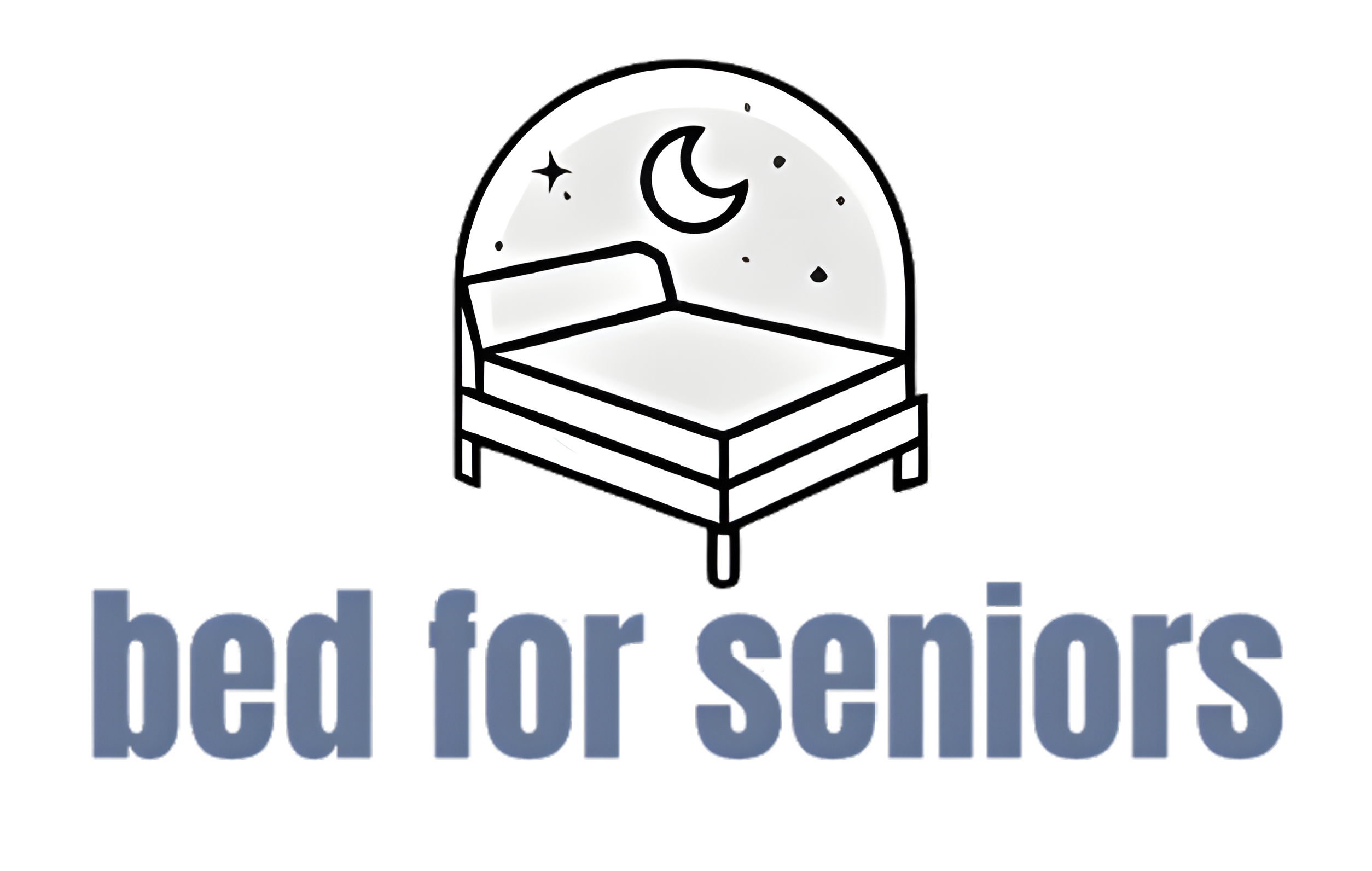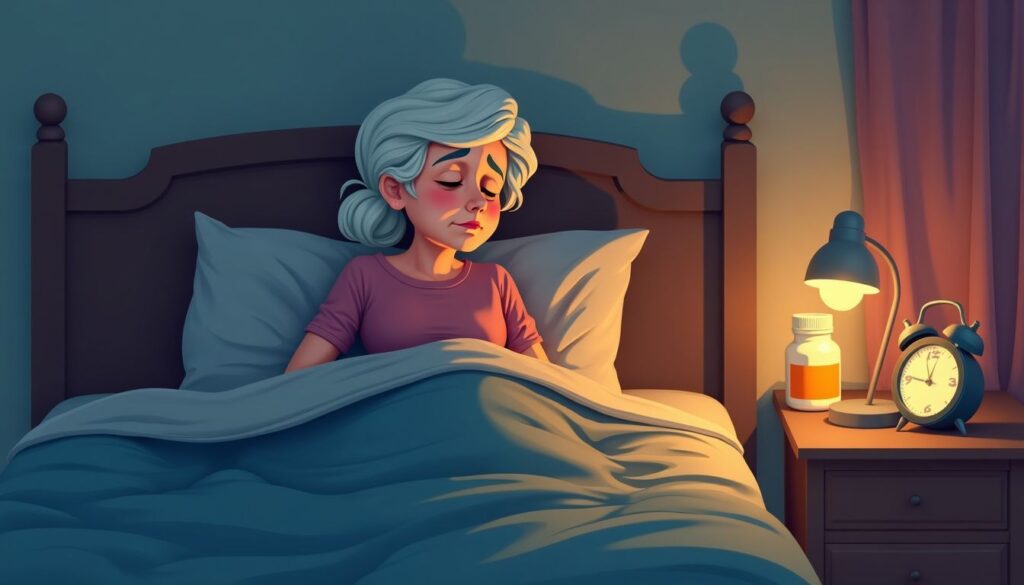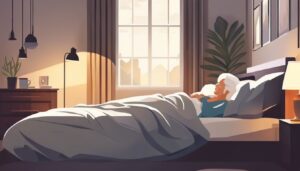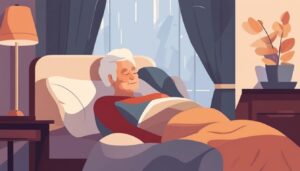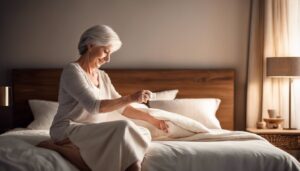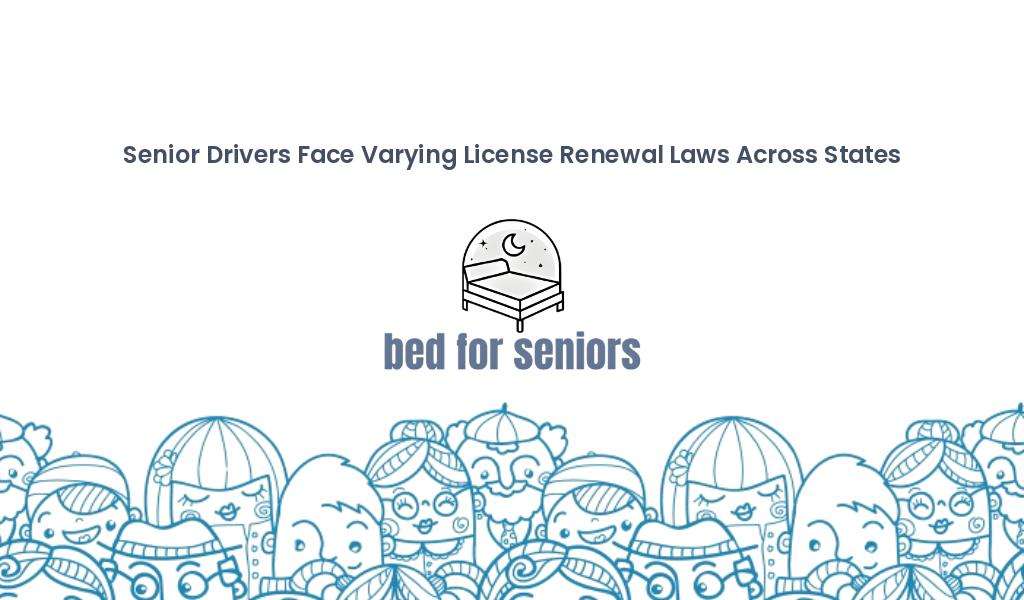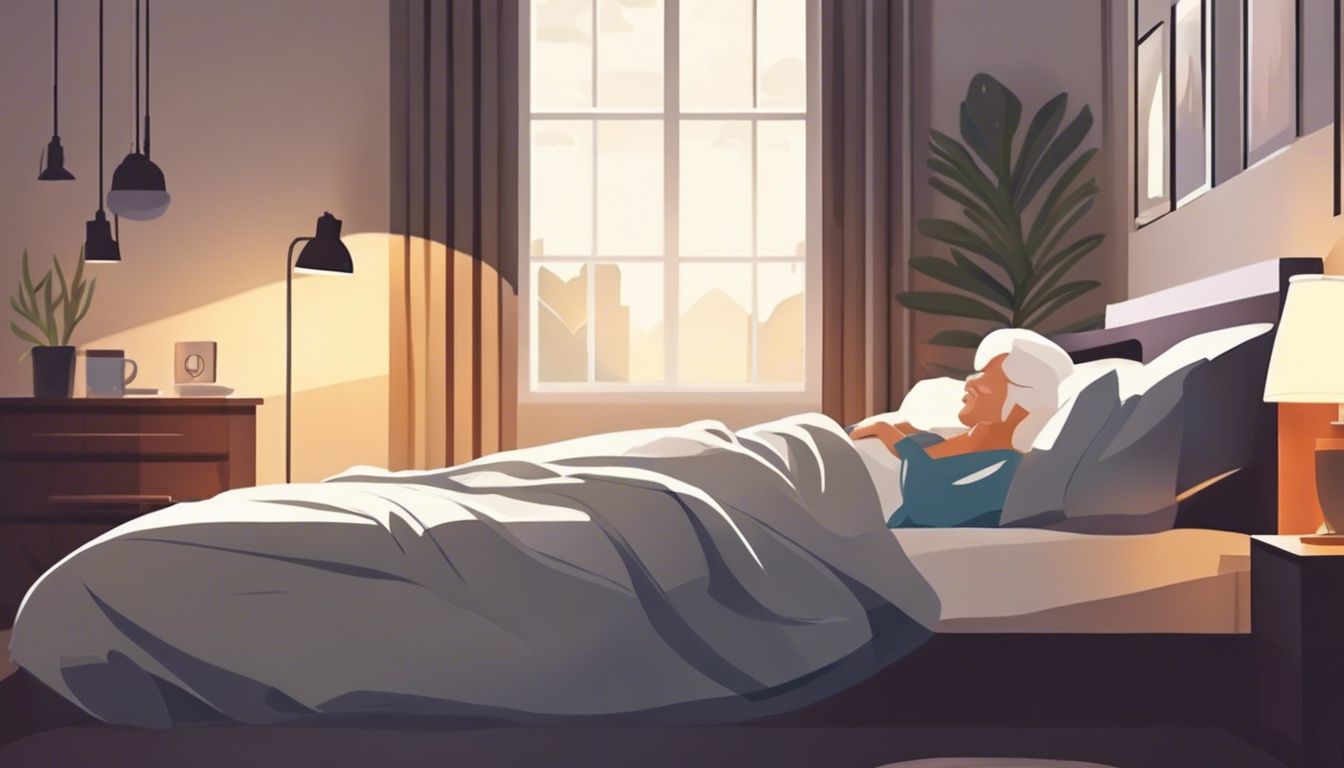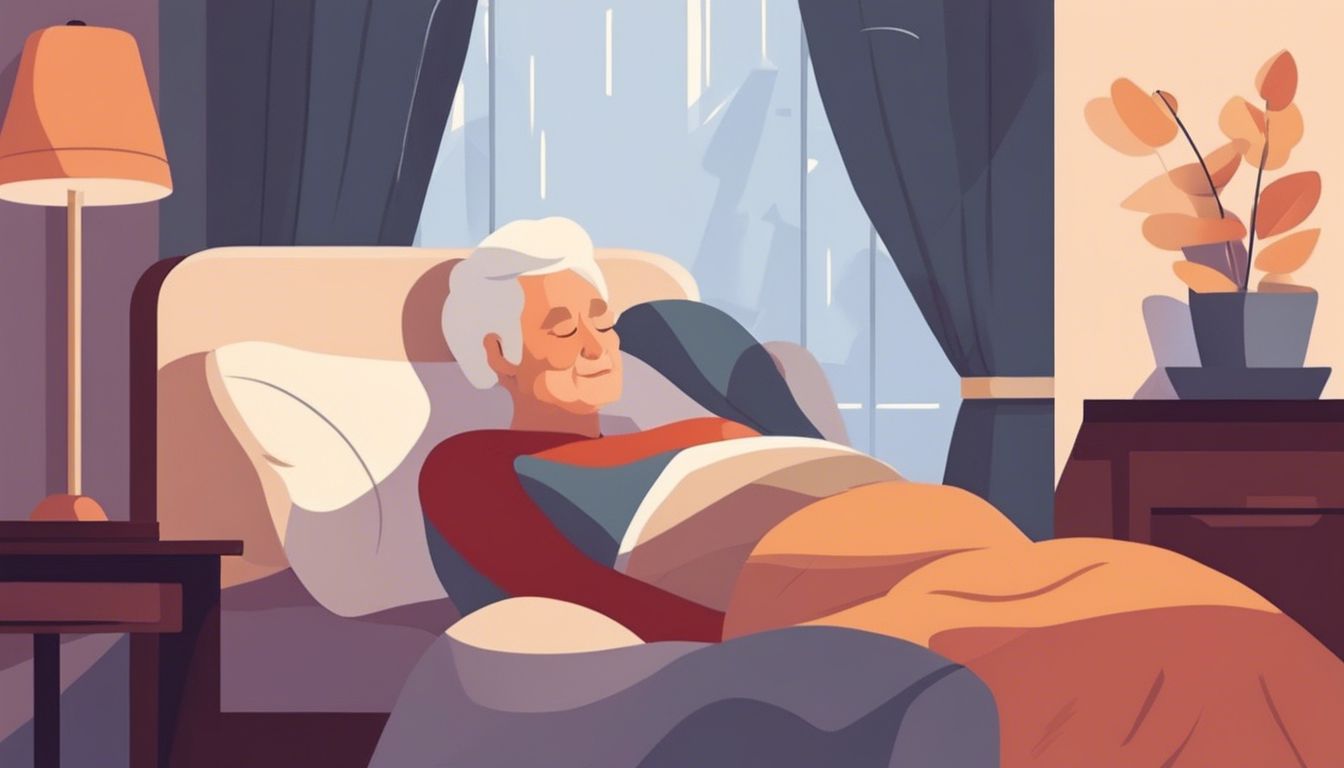Many people find it harder to sleep as they get older. The National Sleep Foundation says adults need seven to eight hours of sleep each night. This blog will show you why sleeping changes with age and how to deal with those changes.
Read on, we’ve got you covered.
Key Takeaways
- Older people often sleep less at night and take more naps during the day. Their sleep gets interrupted by waking up often.
- Changes in body clocks and hormones like melatonin make it hard for them to fall asleep and stay asleep. This can lead to feeling tired in the daytime.
- Sleep disorders, such as sleep apnea and insomnia, are more common in older adults. These issues can affect their health and daily life.
- Making a regular bedtime routine, avoiding screens before bed, and using relaxation techniques can improve sleep for older adults.
- If problems with sleeping last for a long time or disrupt daily life, talking to a doctor is important. They can help find what’s wrong and suggest ways to fix it.
Overview of Age-Related Changes in Sleep Patterns
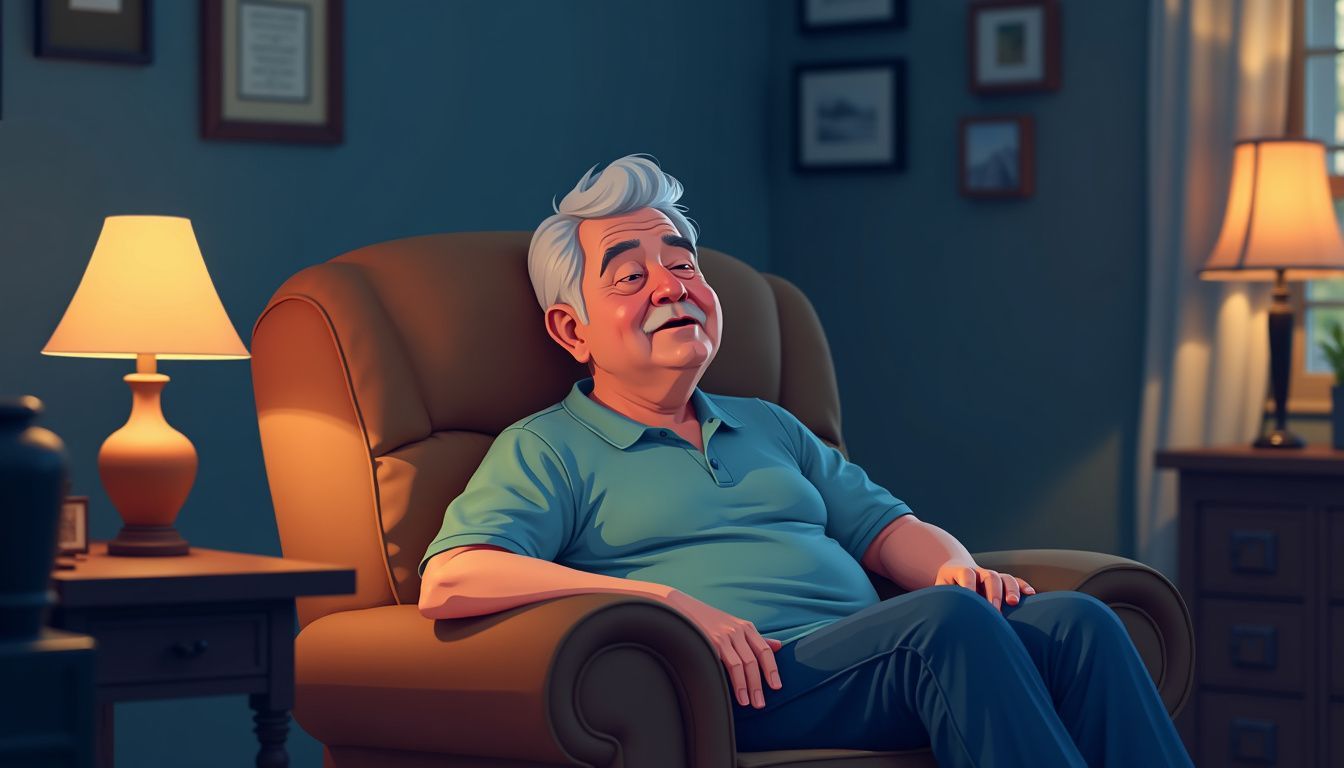
As we get older, our sleep patterns change. You might find yourself going to bed earlier, waking up more at night, and taking more naps during the day.
Advanced sleep timing
Older adults often go to bed early and wake up early. This change happens because their body clocks move forward. Studies, like one by Duffy et al., show this “phase advance” is more than in other body clocks.
They might feel sleepy by 7 PM and wake up at 4 AM. Their sleep pattern shifts due to aging.
This earlier sleep time can make it hard for them to stay awake late in the evening. It also means they might not get enough deep sleep at night. Getting light during the day can help keep their body clock on track.
So, taking walks outside or sitting near a window during the day is good for them.
Shortened nocturnal sleep duration
As people get older, they often find themselves sleeping less at night. Total Sleep Time (TST) shows this trend clearly. Young adults might sleep around 10.5 hours, but for older adults, it drops to 8.1 hours.
The change doesn’t stop there; every ten years, men lose about 8 minutes of sleep and women lose about 10 minutes.
This shorter sleep time can lead to more daytime naps but also makes it harder for seniors to stay asleep all night. They might wake up often or have trouble falling back asleep if they wake up in the middle of the night.
Such changes are not just numbers on a clock—they affect how rested someone feels the next day and can impact their overall health.
Increased frequency of daytime naps
Older adults nap more often. Studies show 27.4% of them take frequent naps compared to 11.9% of young people. They mainly nap in the early evening to make up for lost sleep at night or just to relax.
This increases their daytime drowsiness.
The next topic tackles the rise in awakenings during the night that seniors face, making their sleep less steady and restful.
Increased number of awakenings during the night
As people get older, they wake up more often during the night. This happens because sleep becomes less deep. The time spent awake after first falling asleep grows longer too. These awakenings can make sleep feel broken and less restful.
Good sleep hygiene helps manage these frequent wake-ups. Keeping a steady bedtime routine makes a big difference. Cutting down on caffeine and creating a calm sleeping area are key steps to take.
They help reduce the number of times someone wakes up at night, leading to better rest overall.
Impact of Circadian Rhythm Changes in Aging
As we age, our body clocks change, making sleep patterns shift — understand more to help adjust.
Phase advance
Phase advance makes older adults sleep and wake up earlier than they used to. This shift happens because their biological clock changes. A study by Duffy et al. found that this change in sleep timing is more significant than in other body clocks.
Because of phase advance, seniors may find themselves tired early in the evening and awake at dawn. It affects not just when they sleep, but also how well they rest through the night.
Reduced amplitude in circadian rhythms
As people age, their internal clocks lose strength. This means the daily ups and downs of body temperature and sleepiness get less clear. These changes make older adults feel sleepy earlier in the evening and wake up earlier in the morning.
The weaker signals also mess with deep sleep stages. Older folks have a hard time staying asleep because their circadian rhythms don’t tell their bodies to sleep as strongly as before.
This leads to more wake-ups during the night and often more naps during the day.
Decreased ability to adjust to phase shifts
Older adults find it hard to change their sleep times. This is because their bodies don’t adjust well to phase shifts. As people age, their internal clocks slow down. They struggle more with jet lag or changes from daylight saving time.
The peak of circadian melatonin rhythm happens later for them. So, falling asleep early becomes tough. And then, waking up at the desired time is harder too. This leads to problems like fragmented sleep and daytime drowsiness in older individuals.
Influence of Sleep-Related Hormones on Aging
As we age, our bodies make less sleep-helping hormones. This change messes with how well we rest at night.
Decreases in melatonin and growth hormone
Melatonin and growth hormone levels drop as people get older. This change can mess up sleep patterns. Less melatonin means it’s harder to fall asleep and stay asleep. Lower growth hormone affects how deep sleep is, making rest less refreshing.
Next, cortisol and thyroid-stimulating hormones play a role too.
Variations in cortisol and thyroid-stimulating hormone levels
Cortisol and thyroid-stimulating hormone levels change as people get older. These hormones are key for sleep. High cortisol can make it hard to sleep well. The thyroid gland makes hormones that control how fast your body works.
If this gland is not right, sleeping can be tough.
Older adults often see these hormone changes, affecting their sleep patterns. For example, higher evening cortisol levels may lead to waking up at night. Also, if the thyroid is too active or not active enough, it can cause big sleep problems.
So, keeping an eye on these hormones is important for good sleep in aging adults.
Changes in sex hormones affecting sleep
Sex hormones like testosterone, estradiol, and progesterone change as people get older. In men, testosterone levels go down. In women, amounts of estradiol and progesterone drop too.
These changes can make sleep worse in older adults. They might find it hard to fall asleep or stay asleep.
These hormone shifts can lead to more sleep disturbances. Older adults may wake up often during the night. They also might have trouble getting deep sleep. Knowing this helps in managing sleep problems better for seniors.
Common Sleep Disorders in Older Adults
Older adults often face sleep issues like Sleep Apnea and Restless Legs Syndrome. These disorders disrupt their night’s rest, leading to daytime tiredness and other health problems.
Sleep Apnea
Sleep apnea affects many older adults. This sleep disorder makes people stop breathing while they sleep. More folks get it as they age. Sleep apnea can lead to tiredness during the day and other health issues.
Doctors use tools like sleep studies to find if someone has this problem. Changes in bedtime habits also help. If you care for someone older, watch for signs of sleep apnea, like loud snoring or gasping for air at night.
Restless Legs Syndrome
Moving from sleep apnea, let’s talk about Restless Legs Syndrome. This condition often hits older adults hard. It makes their legs feel very uncomfortable, especially when lying down or sitting for long times.
This feeling usually happens at night. To get rid of it, they feel the need to move their legs a lot.
Restless Legs Syndrome can mess with sleep big time. People with this issue find it hard to fall asleep and stay asleep. They end up waking up tired, not refreshed. Because of these sleep troubles, their days can also be tough.
Insomnia
Insomnia hits many older adults hard. Half of them with depression can’t sleep well. They spend hours lying awake. It’s not just about feeling tired the next day. Poor sleep hurts their health, making heart disease and memory problems like Alzheimer’s worse.
Good sleep habits help fight insomnia. Going to bed at the same time every night matters a lot. So does turning off screens before bedtime to keep blue light away from their eyes. Relaxation techniques also make a big difference in getting better rest.
Next, let’s talk about dealing with nighttime bathroom trips…
Factors Exacerbating Sleep Issues in Aging
Pain, taking some meds, and more trips to the bathroom at night can make sleep problems worse for older people. Find out how to help with these issues by reading on.
Chronic pain and neurological illnesses
Chronic pain makes sleep hard for older adults. It hurts and keeps them awake. Neurological illnesses like Parkinson’s disease also harm sleep. These problems affect the brain and nerves, making it tough to fall asleep or stay asleep through the night.
Older people face more nighttime wake-ups because of these issues. Pain and body troubles change their sleep quality a lot.
Doctors know that good sleep is key for health, but chronic pain and diseases like Alzheimer’s can ruin it. To help, they might suggest changing medications or trying new sleep habits.
For some, this means less coffee or setting up a better bedtime routine. Simple steps can make a big difference in fighting off the bad sleep caused by pain and illness in aging folks.
Use of certain medications
After talking about chronic pain and its impact, it’s clear some medicines can disrupt sleep. About 90% of people over 65 take meds; more than a third use five or more daily. These drugs often mess with sleep patterns.
Sleep medicine doctors see many older adults struggle with rest because of their prescriptions. For instance, meds for high blood pressure or depression might make it hard to stay asleep.
It leads to more night-time wake-ups and less deep sleep overall.
Increased frequency of nocturnal bathroom trips
Older people often go to the bathroom more at night. This is named nocturia. It can break up their sleep and make them wake up many times. Nocturia gets in the way of deep restful sleep cycles.
Good sleep is key for health, but nocturia makes it hard. Solutions like reducing drinks before bed may help. Caregivers should watch this problem closely because it affects daily life too.
Strategies to Improve Sleep in Older Adults
Good sleep is key for health, especially as we get older. To help with this, setting a regular bedtime can make a big difference. Also, cutting down on screen time before bed can lead to better rest.
Establishing a regular sleep schedule
Going to bed and waking up at the same time every day helps older adults sleep better. This routine matters a lot. It makes their body clock, or circadian rhythm, stay in line. A consistent bedtime routine is key for good sleep quality.
Turning off screens, reading a bit, and keeping the room dark make falling asleep easier.
Making this schedule needs effort but pays off by improving sleep hygiene. Avoiding naps late in the day helps too. Older adults find they wake up less at night and feel more rested during the day.
With these steps, managing sleep becomes simpler and adds to overall health.
Reducing blue light exposure before bedtime
Turning off screens and devices that give off blue light can make sleep better. This means putting away phones, tablets, and computers before bedtime. Blue light tricks your brain into thinking it’s daytime, which makes falling asleep hard.
Start this habit about an hour before you plan to sleep. Use low-light lamps instead of bright room lights. This helps your body get ready for sleep by boosting melatonin, a hormone that controls sleep cycles.
Your sleep quality will improve with these changes.
Incorporating relaxation techniques
Meditation and deep breathing help a lot. They calm the mind and make sleep better. These techniques lower stress, making it easier to fall asleep. People find they wake up less at night after doing these before bed.
Next, think about the best sleep positions for seniors.
Best Sleep Positions for Seniors
After learning about relaxation methods, choosing the right sleep positions for seniors is crucial. Sleeping on the side with a pillow between the knees can ease back pain. This position helps keep the spine straight and reduces stress on the back and hips.
For those with breathing problems or sleep apnea, sleeping on their side is also helpful. It keeps airways open.
Lying on your back with a pillow under your knees supports natural spine alignment too. This setup reduces strain on different parts of the body and promotes better rest. However, it’s essential to avoid flat pillows that don’t support the neck properly.
Contoured or orthopedic pillows work best for this purpose as they hold up to aging bodies’ needs, offering comfort and reducing soreness in sensitive areas like shoulders and necks.
When to Consult a Healthcare Professional
If sleep problems affect daily life, talk to a doctor. They can help find the cause and suggest treatments. Keep reading for more tips on better sleep.
Persistent sleep disturbances
Sleep disturbances that last a long time need a doctor’s attention. They can be signs of bigger health issues if ignored. For example, ongoing trouble in getting good sleep might lead to anxiety, depression, or even heart problems over time.
Older adults often face conditions like insomnia or sleep apnea more than younger people. This is because their bodies produce less melatonin, making it harder to stay asleep.
Caregivers should watch for these signs and talk to a healthcare professional without delay. Regular medical check-ups help catch and treat any underlying problems early on. Addressing sleep disturbances quickly improves daily life and prevents other serious health issues from developing later on.
Impact of sleep issues on daily functioning
Transitioning from continuous sleep difficulties, inadequate rest significantly alters how we operate each day. It creates difficulties in concentration and recollection. Regular tasks emerge as challenging.
This decrease in cognitive acuity impacts work, driving, and straightforward interactions. Individuals may also experience more frequent mood swings or feelings of sadness.
Sleep disturbances potentially undermine the body’s resistance to illness. Recovery decelerates. The susceptibility to cardiac issues escalates. Vigor dips, making it arduous to sustain physical activities.
Eating patterns also deteriorate as people might consume more unhealthy food for comfort or resort to energy drinks that exacerbate sleep difficulties in the long run.
Conclusion
Aging changes how we sleep. Older people fall asleep early and wake up often in the night. They nap more during the day but find it hard to stay asleep for long at night. Their bodies make less of some sleep hormones, like melatonin, making good sleep harder to get.
Sleep problems like apnea and insomnia are also more common with age. But there are ways to help, such as keeping a regular sleep time and reducing screen light before bed. If sleep issues don’t get better, seeing a doctor is a good idea.
FAQs
1. How does aging impact our sleep patterns?
Aging can cause changes in our sleep architecture, including alterations in the stages of sleep like REM and slow-wave sleep. It can also result in a phase advance of the circadian system affecting timing of sleep.
2. What are some common age-related sleep disorders?
Common disorders include obstructive sleep apnea, periodic limb movement disorder, REM Sleep behavior disorder and insomnia symptoms often due to nighttime urination or hot flashes postmenopause.
3. Can medical conditions influence an older person’s quality of sleep?
Yes, chronic medical conditions such as Alzheimer’s disease, cardiovascular diseases and cancer can lead to poor quality of rest through mechanisms like inflammation or disturbed mitochondrial metabolism.
4. Does biological aging affect the body’s circadian rhythms?
Indeed! The suprachiasmatic nucleus (SCN), which regulates our circadian clocks is influenced by natural processes such as cellular senescence and DNA damage causing disruptions in the normal cycle.
5. How does social isolation factor into age-related changes in sleeping habits?
Social isolation may contribute to daytime drowsiness or siesta during day hours leading to disrupted night-time rest periods further exacerbating issues with normal regulation of the sleep-wake cycle.
6. Are there any tips for improving an elder’s sleeping environment?
Maintaining good “sleep hygiene” helps – this includes keeping a consistent bedtime schedule, ensuring their room is quiet and dark at night and promoting regular exercise during daylight hours.
